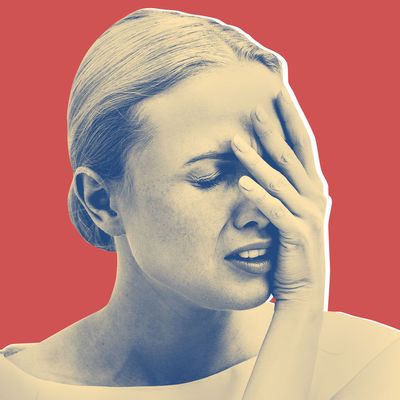
There comes a point where run-of-the-mill stress stops feeling so run-of-the-mill. Like when you seem to lose the ability to fall asleep, or when the sleep you do get is haunted by dreams that leave you restless. Or when that nagging tightness in the pit of your stomach has been there so long that you can’t even remember how the feeling started. Or when your stress abruptly spirals into a racing heart and shortness of breath.
Maybe these are signs that you aren’t stressed. Maybe you have stress’ debilitating counterpart: anxiety. We tend to use the two words interchangeably, but in reality, they mean dramatically different things. Stress — your body’s natural response to the demands of daily life — can often be helpful, motivating you to take on challenges in your work and personal life. But anxiety is an extreme version; the DSM classifies generalized anxiety disorder as excessive worry about a variety of topics lasting for six months or more.
According to the Anxiety and Depression Association of America, anxiety disorder is the most common mental illness in the United States, affecting more than 40 million adults, a disproportionate number of whom are women. (“There is no greater risk factor for anxiety disorders,” writer Andrea Petersen noted in her memoir On Edge, “than being born female.”) While anxiety disorders are generally highly treatable, less than 40 percent of sufferers receive any treatment.
The Cut spoke with Noah Kass, a psychotherapist at NY Health Hypnosis & Integrative Therapy, and Dhvani Patel Lindsey, a licensed marriage and family therapist, about how to tell when stress may be something more serious.
How can I tell if what I’m experiencing is anxiety?
Symptoms of generalized anxiety disorder include ongoing feelings of worry or anxiety, restlessness, fatigue, difficulty concentrating, irritability, muscle tension, and sleep problems. The most important word here is ongoing: When they’re triggered by specific stressors, like a looming deadline or an important decision, these feelings are a normal part of life. But once the stressor ends, so should the stress.
“When you’re experiencing stress, it often feels the same as anxiety in the moment,” Lindsey said, but “the two are different in terms of their causes and duration.” Say, for example, you have an important work presentation coming up: “You might feel worried. Maybe you can’t sleep the night before,” she says. “If the presentation goes well and that feeling goes away, then you were experiencing stress. That’s a normal stress reaction. But if the presentation goes well and the next day you’re still worrying and obsessing, and you find it very difficult to control the worry, then you might be experiencing anxiety.”
If anxiety and stress are really that similar, though, what else can I use to tell them apart?
The symptoms of stress and anxiety can often mimic one another, but the defining aspect of anxiety is whether the source of your feelings is clear and logical. “Ask yourself questions: Are the emotions I’m experiencing based on a specific event? Or is there no identifiable cause? If it’s the latter, it’s most likely anxiety,” Kass says. Stress and anxiety are also different in their relationship to time: “Stress is usually about the present,” he explains, while “anxiety is often about a perceived worry about the future.”
And often, for someone with anxiety, the source of the feeling becomes secondary to the feeling itself. Without any one clear trigger for their symptoms, they can become anxious about being anxious, the feeling building on itself until it interferes more significantly with everyday life.
I think I might have anxiety. What should I do about it?
We can’t emphasize this enough: Getting some professional help is the best thing you could do for yourself. “I hate to see people struggling on their own because they were afraid to reach out for the help they need,” Lindsey says. “Doctors and therapists are trained, and we’re here for you.” The treatment plan you develop with your mental-health practitioner could include therapy, medication, or a combination of the two. Therapy may mean talk therapy, cognitive behavioral therapy, or attending a support group, while medications may include antidepressants, anti-anxiety drugs, or beta-blockers.
Lifestyle changes can also help, she adds: “Getting quality sleep, limiting caffeine, exercising, and getting outside in nature can make a big difference.”
In fact, that’s good advice even if what you’re experiencing really is just regular stress. “Someone who doesn’t have anxiety in the clinical sense can still have problematic stress,” Lindsey says, which can be harmful in its own right. Just because you don’t have anxiety doesn’t mean you shouldn’t work to take care of yourself and establish support systems. You should know which one you’re dealing with, but whether you have stress or anxiety, it’s important to remember to show yourself a little kindness.




